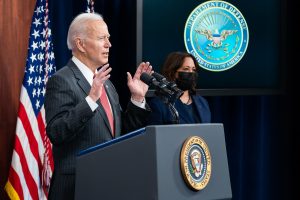Trust in the United States has risen among Southeast Asian policymakers over the past year while trust in China has fallen, according to an annual survey of regional opinion conducted by Singapore’s ISEAS-Yusof Ishak Institute.
The institute’s yearly “State of Southeast Asia” survey reports, based on interviews with around a thousand policymakers, journalists, businesspeople, and pundits from all 10 states of the Association of Southeast Asian Nations (ASEAN), have become an invaluable gauge of elite regional opinion on key questions, including competition between China and the United States.
There’s a lot to of interest in the latest report, which is perhaps unsurprising for 2020, a year dominated by the COVID-19 pandemic, internal upheavals in several Southeast Asian nations, and increasing tensions between the U.S. and China.
The most obvious and striking is the shift in relative regional opinion about the two superpowers. When asked which power they would align with if hypothetically forced to choose, 61.5 percent of respondents said they would rather align with the U.S. compared to 38.5 percent for China, a significant drop from the 46.4 percent who chose China in last year’s report. The study’s researchers also noted that China was the only major power to have registered an increase in distrust from Southeast Asian countries, which rose from 60.4 per cent in 2020 to 63.0 per cent in 2021.
In general, the report further underlines findings of recent years’ surveys: namely, that Southeast Asian elites are impressed by China’s power, but fearful of it. Some 76.3 percent of respondents described China as the most influential economic power in Southeast Asia (compared to 7.4 percent for the U.S.), though 72.3 percent also described this as a “worry” for the region. Similarly, 49.1 percent described China as the most important “political and strategic” power in the region, a fact that worried no fewer than 88.6 percent of respondents.
“China’s predominant economic and political influence in the region has created more awe than affection,” stated the report’s authors. “The majority worry that such economic heft, combined with China’s military power, could be used to threaten their country’s interest and sovereignty.”
These findings seems to indicate that China’s bungling in the early stages of the COVID-19 pandemic, its continuing belligerence in the South China Sea, and its “wolf warrior” diplomacy have all taken a toll on its reputation in the region. Interestingly, there is a widespread perception that China has been the most forthcoming with COVID-19 support for the region. 44.2 percent of respondents said China had provided the most support to the region during the pandemic, ahead of Japan (18.2 percent), the European Union (10.3 percent), and the U.S. (9.6 percent). This suggests that Beijing’s COVID-19 outreach and “vaccine diplomacy” is having a limited effect.
The United States, meanwhile, “made a surprising turn-around” in regional perceptions from a year ago, with 48.3 percent of respondents viewing it positively compared with 30.3 percent in 2020. Those Southeast Asians who trust the U.S. said they believed it had the “political will to provide global leadership” and that its military power “is an asset for global peace and security.”
The report also showed that Japan, as in last year’s survey, remained the region’s partner of choice: respondents expressing confidence in Japan rose from 61.2 percent last year to 67.1 percent in the 2021 report. Meanwhile, the proportion of those who expressed confidence in the EU rose from 51 percent in 2021, up from 38.7 percent last year.
If the souring views of China reflect its increasing power and belligerence, the improving perceptions of the U.S. seem to reflect the optimism that has attended the end of the presidency of Donald Trump.
The ISEAS-Yusof Ishak Institute conducted the surveys between November 18, two weeks after Trump’s defeat in the U.S. election, and January 10, ten days before President Joe Biden’s inauguration. The report’s authors attribute the positive outlook for the U.S. to “the general optimism that the new Biden administration will pivot back to Southeast Asia.” This was reflected in the 68.6 percent of people who believed that U.S. engagement would “increase” under Biden.
The interesting question is the extent to which the more positive perceptions of the U.S. are the result of a temporary “Biden bump,” or reflect a more permanent shift in perceptions. As the reports author’s wrote, “Only time will tell if the region’s renewed trust in the U.S. is misplaced or not.”

































